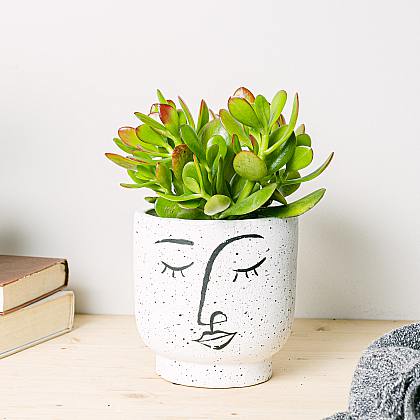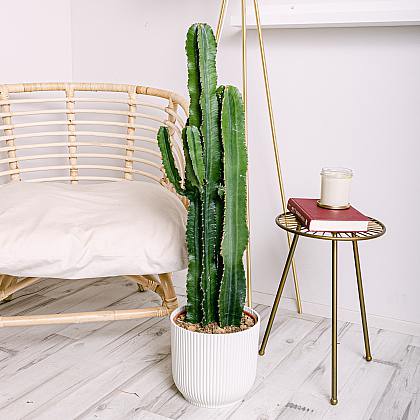Learn how to choose the perfect substrate for your houseplants!
Learn how to choose the perfect substrate for your houseplants! If you're a plant lover and want to see them grow and bloom in all their glory, then you've come...
Learn how to choose the perfect substrate for your houseplants! If you're a plant lover and want to see them grow and bloom in all their glory, then you've come to the right place. In this article, we'll reveal the best-kept secrets about substrates, the material that's so important for the growth of our beloved little plants. You'll find out what the most common types are, how to create custom mixes, special considerations for different plants, and much more. So get ready to delve into the fascinating world of substrates and become an expert indoor gardener. Start!
The Importance of Substrate in Houseplant Growth
When it comes to growing houseplants, choosing the right substrate is critical to their growth and development. Substrate is the medium in which plant roots anchor themselves and obtain the nutrients needed to survive. It's like the home of our plants, so it's important that it's cozy and nutritious. A quality substrate provides good aeration and water retention, allowing the roots to breathe and absorb the necessary moisture. In addition, a good substrate provides the essential nutrients for healthy plant growth. If the substrate is not suitable, plants may struggle to absorb the necessary nutrients, which can result in slow or poor growth. On the other hand, a poor quality substrate can hold too much water, which can lead to root rot and disease problems. So remember, when choosing the substrate for your houseplants, don't skimp on quality. Provide them with a comfortable and nutritious home where they can grow and flourish happily. Your plants will thank you with lush green leaves and vibrant flowers.
Most Common Substrate Types and Their Characteristics
When it comes to choosing the right substrate for our houseplants, it is important to know the different types of substrates and their characteristics. Among the most common substrates are potting soil, perlite, and sphagnum moss. Potting soil is a versatile substrate that provides nutrients and retains moisture efficiently. It is ideal for most houseplants. Perlite, on the other hand, is a light and porous material that improves the drainage of the substrate, preventing waterlogging problems. It is especially useful for plants that require more frequent watering. Sphagnum moss, on the other hand, retains moisture and improves the aeration of the substrate. It is ideal for tropical and epiphytic plants. Each type of substrate has its own advantages and characteristics, so it's important to consider the specific needs of each plant before choosing the right substrate. By knowing the characteristics of the different types of substrates, we can ensure that we provide our plants with an optimal environment for their growth and development. Don't underestimate the power of the right substrate! Your plants will thank you with healthy, green leaves that will brighten up your home.
The Perfect Balance: Custom Substrate Mixes
When it comes to growing houseplants, finding the perfect balance in the substrate can make the difference between healthy growth and mediocre growth. Although there are many types of commercial substrates available, it is often necessary to customize the mix to suit the specific needs of each plant. The key is to understand the characteristics of each type of plant and combine the right substrates to create a mix that provides an optimal environment for growth. Some plants prefer a sandier substrate to improve drainage, while others benefit from a richer mix of organic matter to retain moisture. In addition, some plants may require a mixture with higher nutrient holding capacity. In this sense, experimenting with different combinations can be exciting and rewarding, as it allows you to figure out what works best for your plants. Always remember to observe how your plants respond to the mix and adjust it if necessary. At the end of the day, finding the perfect balance in your substrate mix is not only important for the growth of your plants, but it also gives you a special connection with them, as you become responsible for providing them with the right environment to thrive.
Special Considerations for Different Types of Plants
Each plant is unique and has its own needs. That's why, when choosing the perfect substrate for your houseplants, it's important to consider the special considerations for each type of plant. For example, succulent plants, such as cacti, require a substrate that has good drainage to prevent excess moisture in their roots. On the other hand, tropical plants, such as ferns, prefer a substrate that is richer in organic matter and has the ability to retain moisture. For flowering plants, such as roses or orchids, it is advisable to use a specific substrate that promotes flower development and provides the necessary nutrients. In addition, carnivorous plants need a nutrient-free substrate with a suitable texture to trap insects. It is important to research the specific needs of each plant before choosing the substrate, as this will ensure healthy growth and a radiant appearance. Remember that taking care of your plants is like taking care of a small green family, so take the time to understand them and provide them with the right substrate so that they can flourish and grow happily in your home.
The Role of Drainage in the Substrate to Avoid Watering Problems
The role of drainage in the substrate to avoid watering problems is crucial to keeping our houseplants happy and healthy. Picture this: you have a beautiful plant in a pot, but every time you water it, water collects at the base and the roots get too soggy. This can lead to the development of fungi and diseases that can harm your plant. This is where proper drainage comes into play.
A good substrate should have a porous structure that allows water to flow easily through it. This is achieved by using materials such as perlite, vermiculite, or sand, which help create air spaces between substrate particles. These spaces allow excess water to drain quickly, thus preventing saturation of the roots.
If there is not good drainage in the substrate, water will remain stagnant in the pot, which can suffocate the roots and cause root rot. In addition, excess moisture can also affect the plant's absorption of nutrients.
To ensure effective drainage, it's important to use pots with holes in the base to allow water to flow freely. You can also place a layer of gravel at the bottom of the pot before adding the substrate, this will help to further improve drainage.
Remember, good drainage in the substrate is essential to avoid watering problems and keep your plants happy and healthy. So make sure you choose a substrate with a good porous structure and don't forget to regularly check your pots to make sure there is no water build-up at the base. Your plants will thank you!
Organic Substrates vs. Synthetic Substrates: Pros and Cons
When it comes to choosing the perfect substrate for our houseplants, the eternal question arises: organic or synthetic? Both options have their pros and cons, so it's important to consider the needs of our plants and our own values when making a decision.
Organic substrates, such as peat moss or compost, are natural and environmentally friendly. In addition, they retain moisture effectively, reducing watering frequency and helping to maintain a moist environment for the roots. These substrates also provide organic nutrients to the plants, promoting healthy growth. However, they can be more expensive and may contain unwanted organisms such as insects or diseases.
On the other hand, synthetic substrates are specifically designed to provide a porous structure and allow good water drainage. They are cheaper and pest-free, making them ideal for those concerned about the health of their plants. However, because they are chemicals, they do not provide organic nutrients to the plants and may require greater watering control.
Ultimately, the choice between organic and synthetic substrates depends on our personal preferences and the needs of our plants. We can opt for a combination of both types to get the best of both worlds. The most important thing to remember is that regardless of the substrate chosen, we need to make sure that we provide our plants with a suitable environment for their healthy growth and development.
Additional Tips to Keep Your Plants Happy and Healthy
To keep your plants happy and healthy, here are some additional tips that will go a long way. First of all, it is important to pay attention to the specific needs of each plant. Research the specific care that each one requires and adjust to it. Also, make sure you provide them with the right amount of sunlight. Some plants prefer direct light, while others are more comfortable with indirect light. It's also crucial to water them properly. Avoid both too much water and too little water. Look at the leaves and substrate to know when they need to be watered. Another recommendation is to maintain a suitable environment in the home. Avoid sudden changes in temperature and drafts that can affect your plants. Finally, don't forget to give them love and attention. Take the time to care for them, remove dry or diseased leaves, and make sure they're clean. Plants also need to feel loved in order to thrive. Follow these tips and you'll see how your houseplants will always be happy and healthy, filling your home with life and natural beauty.
So there you have it, now you know the importance of choosing the right substrate for your houseplants. By knowing the different types of substrates and their characteristics, as well as the custom blends you can create, you'll be well on your way to having happy, healthy plants in your home. Remember to consider the specific needs of each plant and make sure the substrate has good drainage to avoid watering problems. Also, don't forget to weigh the pros and cons of organic and synthetic substrates before making a decision. But what about you? What is your experience with the perfect substrate? Have you had any particular problems or successes with your houseplants? Let us know in the comments and let's continue learning together about the fascinating world of plants!


